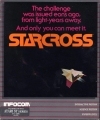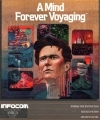Science fiction meets interactive fiction
First posted on 07 July 2007. Last updated on 13 August 2010.

|
| Planetfall |

|
| Stationfall |

|
| Starcross |

|
| The Hitchhiker's Guide to the Galaxy |

|
| A Mind Forever Voyaging |
About the author
David Ledgard is the author of Spacestation, an interactive fiction game based on the transcript from Infocom’s Planetfall and Stationfall.
For more information on Spacestation, visit Free Working Infocom Sample Transcripts.
In the early days of computer gaming, 2 publishers dominated the market of text adventure games on the personal computers—Infocom (1979-1989) from Cambridge, 'New' England and Magnetic Scrolls (1983-1991) from London, 'Old' England. Both companies were among the first commercial game developers of text adventures, better known as interactive fiction. While the earliest games in interactive fiction centered on only the fantasy world largely typified by dungeon crawls and treasure quests, later games had expanded to experiment with other themes including mystery and even comedy. Despite the diverse subject matters which these games eventually embraced, science fiction remained as the most common alternative theme explored by interactive fiction.
In this article, I seek to highlight a selection of the early commercial interactive fiction titles that are primarily rooted to science fiction. All of these titles are by Infocom. Here, I shall not discuss games in which the dominant theme is fantasy based, even if they have some elements within which may be seen as rooted to science fiction. Examples of these latter games include those which use some systems of magic (in the form of portions, scrolls, etc.) such as Enchanter, Sorcerer, and Beyond Zork.
It is a shame that Activision, after acquiring Infocom, has never chosen to release these games for free or bundle them with other games for retail sale. The last commercial release is a compilation in 1996 by Activision called Classic Text Adventure Masterpieces that includes some but not all of the sci-fi interactive fiction titles from Infocom. It is ironic to note that The Hitchhiker's Guide to the Galaxy, a game not included in the compilation, is written by Douglas Adams, who is also the designer of Starship Titanic, an adventure game that is published by Activision years later. Of course, Activision has never seen it fit, in its infinite wisdom, to bundle The Hitchhiker's Guide to the Galaxy with Starship Titanic!
Planetfall
Planetfall (1983) is the game dearest to my heart among all interactive fiction titles. It was a poster I first saw in York, England that sold me the game, "It's not just a job. It's an adventure." I remembered my father had dished up the $30.00 GBP for the game, which was not an inconsiderable sum back in 1986. I also remembered a picture of the Stellar Patrol Officer holding a mop and a bucket on the poster that advertised the game.
In Planetfall, you play a lowly ensign on a Stellar Patrol Ship cleaning up the mess on decks after an Alien Ambassador. Suddenly, a blast rocks your ship. Your overbearing superior Blather pegs it to you (30 demerits!), leaving you just enough time to find an escape pod away from the exploding ship. The pod eventually crashes to the nearby planet Resida, where you must once again escape before the pod sinks to the ocean bottom. On the planet, you are able to locate a nearly abandoned complex (with dorms), where you are greeted by the loveable '8 year old' robot and sidekick named Floyd, "Are you a planner person or science person?" To win the game (and get your cute Red Head), you must fix several broken systems that are keeping inhabitants on the planet alive and run the gauntlets of Mutants, a Radiation Chamber, and even a Miniaturization Booth. If you succeed, you will be declared a hero for the planet, before beaming back to your ship. The game is written by Steve Meretzky and is considered to be state of the art for interactive fiction for its time (and all of it on only 330KB of disk space). It incorporates a number of novel game elements, such as hunger and dreams. The game package also comes with lots of goodies (called feelies) that includes even a Stellar Patrol ID Card.
To this day, I still remembered the time when I went through most of the 999 combinations just to open the door and gain access to the Conference Room and the Teleportation Booth in the game, all without the Access Card!
Stationfall
Stationfall (1987) is the sequel to Planetfall. After your heroic deeds on Resida, you are promoted from doing dull scrub work to dull paper work as an officer of the Third Galactic Union. Your job, basically, is to get forms for the forms (arrrrggggg!)... Fortunately, you soon find your robot pal Floyd and wisely choose him to accompany you on a mission to a space station. There, Floyd meets his new 'best friend' Plato (a fellow robot) and 'baby' Oliver ("When Oli wake by???"). You also discover that all the human inhabitants have disappeared from the station and that all the electrical equipments are not working right. Where are the humans? Why are the robots misbehaving? These are the questions you must answer to win the game. As with Planetfall, the game is written by Steve Meretzky, with footnotes that are borrowed from The Hitchhiker's Guide to the Galaxy.
Interestingly, what I most remembered about Stationfall was its copy protection. To get to the Pulp Factory Paper Spacestation to pick up your forms in the Spacescooter, I would have to punch in the right coordinates found on a form that was included in the game package. I also drew my own blueprint of the Science Sub-Module much like other blueprints that came with the game package. I even programmed a LCD display linked to my beloved Amstrad PC1512 computer (with 512K RAM) to display all 0-9 ranks (as with Shady Dan's hacked ID cards) in the game. Why not? Grand Fleet Hyper Admiral! My biggest regret was that I ruined much of the fun of playing this game when I could not stop myself from looking up INVISICLUES each time I got stuck ("EXAMINE CEILING IN PET STORE").
Starcross
Starcoss (1982) is written by Dave Lebling and is the first sci-fi interactive fiction title from Infocom. You play a miner from an asteroid mining ship, the Starcross, that has located a massive starship of unknown origin, the Generation Starship, at the outer fringes of the galaxy. Once inside, you discover that the ship is inhabited by representatives from many different alien civilizations, each with a different colored rod which you need to collect to win the game.
What I most remembered about Starcross was the map included in the game package which I would need in order to find the range, theta, and phi circular coordinates for positioning the ship. I also remembered the puzzle with the double black discs (which apparently got a lot of gamers stuck) that appeared to be difficult on the surface but which was actually quite simple to solve once I knew how.
The Hitchhiker's Guide to the Galaxy
The Hitchhiker's Guide to the Galaxy (1984) is written by Douglas Adams and Steve Meretzky, loosely based on Douglas Adams' book of the same name. For the majority of the game, you play as Arthur Dent, though you also assume the roles of Ford Perfect, Zaphod Beeblebrox, and even Trillian at various time points ("WHO AM I?"). The game is not as good as the book or the original BBC Radio version, but it is still well worth of a try for any fan of the series.
For me, the puzzles in The Hitchhiker's Guide to the Galaxy were among the most difficult puzzles I had ever solved. These included the notorious Babel Fish Dispenser and the Vending Machine (to get Arthur his cup of tea). Included with the game package was even a bit of "pocket fluff" that was meant to be the bits of fluff from the game!
A Mind Forever Voyaging
A Mind Forever Voyaging (1985) is perhaps the most unique of all sci-fi interactive fiction. The game is written by Steve Meretzky. Unlike other sci-fi titles from Infocom, this game centers heavily on a political theme that is a departure for the developer. In the game, you play PRISM, a sentient supercomputer that, until now, has been programmed to live in a stimulated world thinking itself as an ordinary human named Perry Simm. The real world is in danger from overpopulation and economic collapse, and PRISM has been created to solve these problems. When the creator of PRISM finally informs it of its true nature, it agrees to continue to help with running the stimulation of a revitalization plan proposed by the government to solve these problems in order to foresee the possible impact of this plan on humanity in the future. The game is won when you finally foil the senator who is trying to execute this plan which, from what you have learned, will have disastrous consequences on humankind.
What I found most intriguing about A Mind Forever Voyaging was not the political inference it drew from the world's government of that time but the philosophical debate of self-awareness and existence. Much like an adult growing up from a child, PRISM also underwent its own development as Perry and learned like humans inside the simulated world. At the end of the game, PRISM even consciously chose to retire as Perry despite its awareness that the world in which Perry lived was only a simulation. In other word, it chose to think as human, and who could say to be otherwise? As the philosopher René Descartes said, "Cogito ergo sum" or "I think, therefore I am."